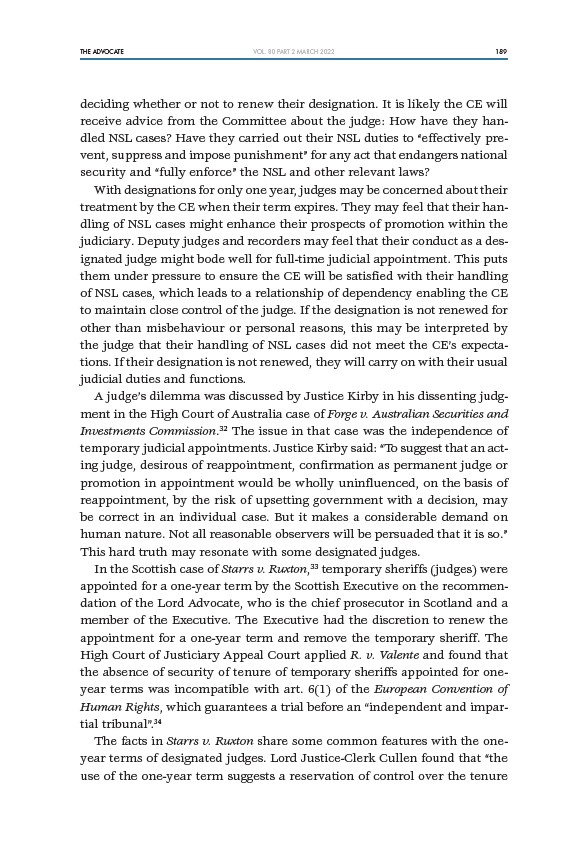
THE ADVOCATE 189
VOL. 80 PART 2 MARCH 2022
deciding whether or not to renew their designation. It is likely the CE will
receive advice from the Committee about the judge: How have they handled
NSL cases? Have they carried out their NSL duties to “effectively prevent,
suppress and impose punishment” for any act that endangers national
security and “fully enforce” the NSL and other relevant laws?
With designations for only one year, judges may be concerned about their
treatment by the CE when their term expires. They may feel that their handling
of NSL cases might enhance their prospects of promotion within the
judiciary. Deputy judges and recorders may feel that their conduct as a designated
judge might bode well for full-time judicial appointment. This puts
them under pressure to ensure the CE will be satisfied with their handling
of NSL cases, which leads to a relationship of dependency enabling the CE
to maintain close control of the judge. If the designation is not renewed for
other than misbehaviour or personal reasons, this may be interpreted by
the judge that their handling of NSL cases did not meet the CE’s expectations.
If their designation is not renewed, they will carry on with their usual
judicial duties and functions.
A judge’s dilemma was discussed by Justice Kirby in his dissenting judgment
in the High Court of Australia case of Forge v. Australian Securities and
Investments Commission.32 The issue in that case was the independence of
temporary judicial appointments. Justice Kirby said: “To suggest that an acting
judge, desirous of reappointment, confirmation as permanent judge or
promotion in appointment would be wholly uninfluenced, on the basis of
reappointment, by the risk of upsetting government with a decision, may
be correct in an individual case. But it makes a considerable demand on
human nature. Not all reasonable observers will be persuaded that it is so.”
This hard truth may resonate with some designated judges.
In the Scottish case of Starrs v. Ruxton,33 temporary sheriffs (judges) were
appointed for a one-year term by the Scottish Executive on the recommendation
of the Lord Advocate, who is the chief prosecutor in Scotland and a
member of the Executive. The Executive had the discretion to renew the
appointment for a one-year term and remove the temporary sheriff. The
High Court of Justiciary Appeal Court applied R. v. Valente and found that
the absence of security of tenure of temporary sheriffs appointed for oneyear
terms was incompatible with art. 6(1) of the European Convention of
Human Rights, which guarantees a trial before an “independent and impartial
tribunal”.34
The facts in Starrs v. Ruxton share some common features with the oneyear
terms of designated judges. Lord Justice-Clerk Cullen found that “the
use of the one-year term suggests a reservation of control over the tenure